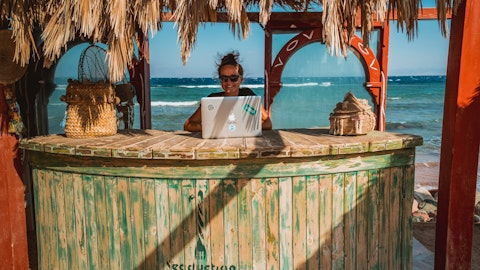Then you also talked about in the letter the shift from goods to experiences, and seeing that as kind of sustaining for longer, right around the MGM story. How does that fit into your M&A strategy, and where you’re focused on finding the right capital allocation? Thanks.
Joey Levin: Sure. So in terms of the ads and leads integration, it’s a really astute question and top of mind for us right now. You focused on the user side, which is where, as it relates to integration, we’ve actually made the most progress. And we have some big things rolling out shortly, actually, along those lines in terms of – again, I’m talking the homeowner side. So previously, the algorithm for how a homeowner would match to historically ads pros and leads pros was complicated and, I’d say, somewhat illogical. And we now have improved the algorithm to the point which we’re getting ready to roll out now, which we’ve been testing for, I don’t know, six or nine months now, to better distribute and better match. And so, a little bit of what we’ve been doing and seeing on the monetized transactions, for SR is a result of what we’ve been testing there, so that a homeowner comes in and has the best chance of matching with the right pros, independent of whether they were historically ads pros or leads pros.
And that is a very big deal for driving the business. On the pro side, which you didn’t ask about, but is also important is. I think there’s still work to do on the integration. So we still have multiple apps. We still have multiple back-end systems. We’re slowly, but steadily migrating folks onto common systems, which will reduce our OpEx, reduce our – or improve our speed of execution. But we still have a lot of work to do on that side of the integration. And it was work that was never done historically, that was sort of hiding in the background. And that we are now tackling and is really important to get done and, I think, will yield real value in terms of our operating efficiency. In terms of capital allocation and the shift towards experiences, those do go hand-in-hand.
That is an area of focus for us for sure. We do – we believe this trend is a long-term trend, has been a long-term trend and will be a trend for a while still to come. And we like the idea of businesses that benefit from that trend. So, we’ve spent a lot of time recently looking in that area and looking deeply in that area, and we’ll continue to do so. Nothing imminent on that, but that is certainly a focus of our capital allocation. And I think if we look at last year, we bought back $165 million of IAC. We bought another $100 million of Turo. We bought $80 million worth of land. And those were, I think, easy transactions in each case given the data at that time. Now with steady cash flow and the businesses, I think, in a more stable place, we’re starting to look more opportunistically externally.
Again, nothing to — nothing immediately on the horizon, but I think we have the position to do that now.
Christopher Halpin: Thank you. Operator, let’s have one last question.
Operator: Thank you. That question will come from Brent Thill with Jefferies. Please go ahead.
Brent Thill: Joey, just a follow-up question on capital allocation. I guess, when you think about what you’re seeing in the private market and asset prices, I’m just curious, many have asked why not have been more aggressive last year when we’ve had this downturn? Are you starting to see asset prices go back up? Are you seeing things maybe not as buoyant as most would expect given the public market recovery? Just curious in terms of kind of what you’re seeing from your perspective?
Joey Levin: Yes. Brent, we tried on a couple of things last year to be opportunistic. That was more public market than private market. And while the valuations were down a lot, to your point, the expected premiums were up a lot, and we couldn’t quite get there on those things. The private market, I think, is still totally irrational, if you – front or rear view. I think that these businesses did a phenomenal job, very smartly raising enough capital to be able to weight out markets. And I think there’s still a lot of capital that has been raised to go after private opportunities, and that capital has a fuse on it to be deployed. And so, the private markets need not be rational on those things. And so, unless something is on the verge of running out of money, I don’t think anybody has to face reality on valuations.
And therefore, it is not, I think, a productive place for opportunity. That is a very broad generalization. And certainly, there will be exceptions to that, if not many exceptions to that. But that’s been our experience so far in looking at opportunities there.
Brent Thill: Yes. Maybe if you have just the time, one quick one on the emerging assets. Anything surprising you in the portfolio that we haven’t talked about as it relates to the smaller emerging stories in the portfolio?



